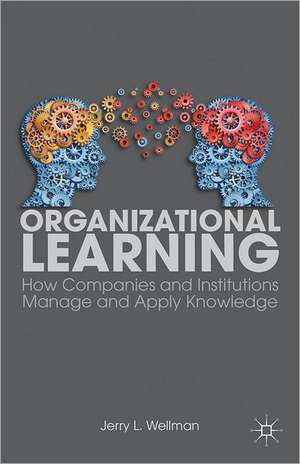Organizational Learning: How Companies and Institutions Manage and Apply Knowledge
Autor J. Wellmanen Limba Engleză Paperback – 27 dec 2012
Preț: 315.57 lei
Nou
Puncte Express: 473
Preț estimativ în valută:
60.39€ • 64.57$ • 50.35£
60.39€ • 64.57$ • 50.35£
Carte tipărită la comandă
Livrare economică 18 aprilie-02 mai
Preluare comenzi: 021 569.72.76
Specificații
ISBN-13: 9781137301543
ISBN-10: 1137301546
Pagini: 202
Ilustrații: XIII, 202 p.
Dimensiuni: 140 x 216 x 13 mm
Greutate: 0.27 kg
Ediția:2009
Editura: Palgrave Macmillan US
Colecția Palgrave Macmillan
Locul publicării:New York, United States
ISBN-10: 1137301546
Pagini: 202
Ilustrații: XIII, 202 p.
Dimensiuni: 140 x 216 x 13 mm
Greutate: 0.27 kg
Ediția:2009
Editura: Palgrave Macmillan US
Colecția Palgrave Macmillan
Locul publicării:New York, United States
Cuprins
Preface Introduction Organizations Generally do not Manage Knowledge Well How Organizations Remember What They Know Culture The Way it is Around Here Old Pros I Remember When Archives It's in Here Somewhere Process The Way Things Work Around Here Putting Them Together Pragmatics of Managing Organizational Knowledge Closing Bibliography Index
Recenzii
"Just as you thought you had read the last work on organizational learning, Jerry Wellman opens a new perspective focusing on the use of knowledge currently available from within our organizations. It is a lens whose obviousness has been ignored to date, but which now can become a set of inter-related practices that we will not be able to live without.
This book is a stunning mixture of case analyses, personal experience, insightful interpretations of professional practices and organizational literatures that provide insight into the four opportunities for learning from within: the use of organizational archives, the employment of its culture, the service of deliberate administrative processes, and the application of knowledge from the experiences of seasoned organizational members. These are discussed individually and as they interact around real issues. While solutions to ubiquitous dilemmas are discussed, one of the major gifts from this book are the substantial, grounded questions, both in number and significance, that Jerry Wellman raises which can open both new doors to organizational learning and important scholarship from those who want to shape studies from the real issues that organizations face. This is the best example of the potential of "practice to scholarship" that I have read.
With a foundation in rich experience and a wide awareness, Jerry Wellman writes in a way that both organizational leaders and scholars will find compatible with theirways of knowing. His interpretations of practices are as full and insightful as is his understanding of the issues around which these practices need to be arrayed. Over a decade ago Nonaka and Takeuchi wrote what was the first foundational text on organizational learning; Jerry Wellman's will be the second." - Robert Silverman, Professor, Fielding Graduate University and Professor Emeritus, Ohio State University
"This book is an original and lucid contribution to a subject long held hostage to dense prose and denser ideas. The author is both a practitioner, with much relevant experience, and has a social science Ph.D. This combination gives the book its uniquely valuable tone and content.I would recommend this book to anyone wrestling with this thorny and elusive subject." - Laurence Prusak, Founder and Executive Director of the Institute for Knowledge Management (IKM)
"This is an atypical book on organizational learning. While many texts in this genre can be very heavy on theory, this text takes a more practical focus, while offering a concise and sound theoretical foundation necessary to get the message across." - Knowledge Management Tools
This book is a stunning mixture of case analyses, personal experience, insightful interpretations of professional practices and organizational literatures that provide insight into the four opportunities for learning from within: the use of organizational archives, the employment of its culture, the service of deliberate administrative processes, and the application of knowledge from the experiences of seasoned organizational members. These are discussed individually and as they interact around real issues. While solutions to ubiquitous dilemmas are discussed, one of the major gifts from this book are the substantial, grounded questions, both in number and significance, that Jerry Wellman raises which can open both new doors to organizational learning and important scholarship from those who want to shape studies from the real issues that organizations face. This is the best example of the potential of "practice to scholarship" that I have read.
With a foundation in rich experience and a wide awareness, Jerry Wellman writes in a way that both organizational leaders and scholars will find compatible with theirways of knowing. His interpretations of practices are as full and insightful as is his understanding of the issues around which these practices need to be arrayed. Over a decade ago Nonaka and Takeuchi wrote what was the first foundational text on organizational learning; Jerry Wellman's will be the second." - Robert Silverman, Professor, Fielding Graduate University and Professor Emeritus, Ohio State University
"This book is an original and lucid contribution to a subject long held hostage to dense prose and denser ideas. The author is both a practitioner, with much relevant experience, and has a social science Ph.D. This combination gives the book its uniquely valuable tone and content.I would recommend this book to anyone wrestling with this thorny and elusive subject." - Laurence Prusak, Founder and Executive Director of the Institute for Knowledge Management (IKM)
"This is an atypical book on organizational learning. While many texts in this genre can be very heavy on theory, this text takes a more practical focus, while offering a concise and sound theoretical foundation necessary to get the message across." - Knowledge Management Tools
Notă biografică
JERRY WELLMAN is Vice President of a 2,000 person business unit within Honeywell International. He has 32 years experience as an engineer and a leader in Honeywell's aerospace businesses. He also holds a BSEE, an MBA, a MA in HOD, and a PhD in HOS.



